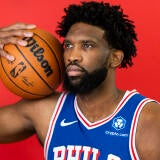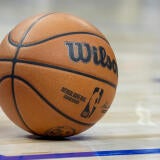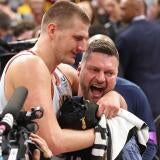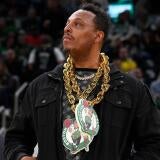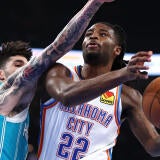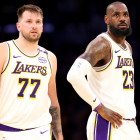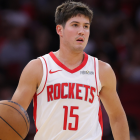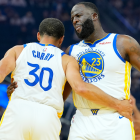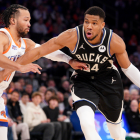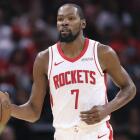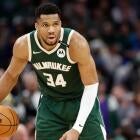A LeBron James-Warriors trade doesn't make sense yet, but here's why that could change in the coming months
A LeBron-Steph partnership remains unlikely, but it makes some sense on paper
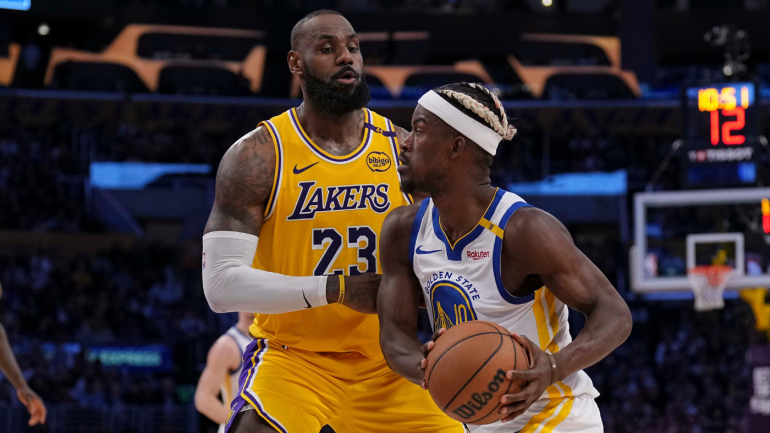
LeBron James has become something of a white whale for the Golden State Warriors. They pursued him at the 2024 trade deadline, but when the Lakers asked James if he wanted to be moved, he said no. They reportedly chased "every star" available at the 2025 deadline, and that included James. Eventually, James decided he would remain with the Lakers once again, and thanks to his no-trade clause, he had the power to block any trade. The Warriors landed Jimmy Butler, and both teams moved on.
Well, at least for a bit. In July, James himself reignited trade rumors two months ago with a statement from agent Rich Paul claiming that he "wants to compete for a championship." What exactly he meant by that statement still isn't clear. Was he nudging the Lakers to invest more draft capital into the trade market to try to improve their 2025-26 roster? Or was he indicating that he wants a trade himself? Thus far, he hasn't clarified his stance.
If it was the latter, though, it seems notable that no significant trade market has yet materialized for him. Four teams have reportedly called about James, but his age and a variety of complicated cap circumstances would make any deal complicated. For most of the offseason, a trade has seemed extremely unlikely.
It frankly still is, but some reporting from Jake Fischer reignited the rumor mill. Last week, Fischer noted that the Warriors "have called the Lakers on multiple occasions over the past 18 months to see whether there is any trade pathway to pairing James with Stephen Curry." Nothing in that reporting beyond its timing suggests that these calls were recent. We've even covered multiple other occasions in the stated timeframe in which the Warriors are known to have pursued James. Frankly, the logistics involved in such a trade would be impractical, at least for the moment.
How could the Warriors acquire LeBron?
The Warriors have two feasible paths to matching salaries for James. The first would be a straight-up swap involving Butler. However, such an arrangement would be untenable for the Lakers at the moment. Butler makes around $1.5 million more than James, but the Lakers are hard-capped at the first apron and have only around $1.1 million in room beneath it. Therefore, such a trade would be illegal for the time being. The Lakers could include other players, but the bigger a deal gets, the more complicated it becomes.
Keep that in mind for our other legal scenario. Rather than including Butler, the Warriors could match money by dealing several smaller salaries, including Draymond Green, Moses Moody and Buddy Hield. However, such a maneuver would hard-cap the Warriors at least at the second apron because they'd be aggregating contracts, and potentially, they could be locked below the first if they take back less money than they send out in the deal, which would be probable. Notably, the Warriors have not signed a single veteran free agent this offseason because they don't want to trigger a hard-cap of any kind. Doing so would potentially put them in a position in which another team could make restricted free agent Jonathan Kuminga an offer sheet that they could not legally match. So they're being patient for the time being. They won't do a thing until Kuminga's situation is settled one way or another.
So for the time being, a James-to-Golden State trade is probably off of the table. But Fischer's reporting was an important reminder that we do know of at least one team that is probably still interested in James. That team is comfortable pursuing him during the season, as it has made overtures at the last two trade deadlines. So even if a trade doesn't make sense at this very moment, there's a team worth monitoring as the offseason progresses and the regular season potentially begins. Because even if there isn't a sensible deal to be made right now, there are a lot of reasons a basic James-for-Butler type of swap, with the Lakers presumably demanding draft capital in the process, actually makes sense here once the Warriors settle their offseason business and the Lakers can figure out a structure that works legally.
Why timelines matter
The simplest explanation for why such a trade makes sense is that these teams just aren't operating on the same timelines. As Paul noted in his statement, James "knows the Lakers are building for the future." The Warriors tried that already. Their two-timeline approach failed. The only two players left from that debacle are Moody, whose role shrank meaningfully in their playoff exit against Minnesota, and Kuminga, who is fighting to leave the team as a restricted free agent. They traded for the aging Butler because they wanted to give Curry and Green one last realistic shot at a championship.
They presumably wouldn't care that James, set to turn 41 in December, is older than Butler because he's the better player. More importantly, he more directly addresses what they need in a Curry co-star. As Golden State's second-round loss to Minnesota showed, Butler isn't capable of serving as a primary, playoff shot-creator without Curry by his side. Curry generates the overwhelming majority of Golden State's offense. James is a better shot-creator than Butler.
But the Lakers have more shot-creation than they know what to do with. Downgrading from James to Butler means quite a bit less with Luka Dončić and Austin Reaves in place. Butler's more consistent perimeter defense, however, would likely be quite beneficial to a Laker team missing Dorian Finney-Smith, who left for Houston in free agency.
Of course, roster balance isn't the primary concern for the Lakers. As Paul noted, they're building for the future. Not too far into the future, but the future nonetheless. Their plan is, presumably, to keep their books as clean as possible so they can either trade for a star or sign one in free agency in either 2026 or 2027. Maybe the free agency path pans out for them. It certainly has in the past, as that is how they landed James in the first place as well as Shaquille O'Neal in 1996. But lately, teams banking on cap space as a savior have been fairly disappointed. No reigning All-NBA player has changed teams via free agency this decade. The two players the Lakers are likely targeting, Nikola Jokić and Giannis Antetokounmpo, will both likely settle their futures well before their potential 2027 free agencies.
More likely, any big names that move in the near future will do so via trade. And that's where a James move starts to make more sense for the Lakers. Even next offseason, when their 2026 and 2033 first-round picks become tradable, they are still operating at a meaningful asset disadvantage in any possible star pursuit. Teams like Houston and San Antonio can dwarf any Laker package when it comes to young talent and draft capital. ESPN's Brian Windhorst has noted that the Lakers are "essentially viewing LeBron as an expiring contract," and part of the logic to stance is that they could try to use cap flexibility as an alternate weapon in trade negotiations next summer. Sure, they don't have many picks to offer, but they could save the other team quite a bit of money.
Maybe that matters to opposing teams. It's hard to imagine that cap space proving so significant that it would close the gap between the Lakers and their asset-rich rivals unless someone specifically forces his way to Los Angeles (which is, again, possible, because we're talking about the Lakers here). Realistically, you could argue that Golden State draft capital would go further in trade negotiations than cap space, especially since Butler would only come attached to an expiring contract himself next offseason. Think about it. Wouldn't you like to control a first-round pick in the future belonging to a Golden State team built around a 41-year-old James and a 37-year-old Curry? That team might be great in the short term but would be a potential long-term disaster. An asset like that would presumably be quite valuable in that eventual star pursuit.
How much draft capital would Golden State be willing to dangle to turn Butler into James? We don't know. Would James waive his no-trade clause for Golden State after declining a chance to join the Warriors in 2024? We don't know that either. We're purely in hypothetical territory for the time being. Deals of this magnitude are enormously complicated to negotiate.
The bottom line
James would have to believe that the Warriors would give him a substantially stronger opportunity to win a championship than the Lakers would. For now, they seem to be in similar tiers. The Warriors would have to believe that James would give them a substantially stronger opportunity to win a championship than Butler would. That's potentially true, but it's uncertain, and it creates a separate issue: if James really is still that good, that means the Lakers are likely looking good enough in their own right that he'd be less inclined to seek a trade. We'd have to see how the rest of Golden State's offseason pans out. We'd probably have to see how beginning of the season goes for both sides. Maybe there will be urgency here down the line. Maybe there wouldn't be. The odds on a blockbuster like this are usually infinitesimal.
The two things we do know are A) James isn't entirely satisfied with the Lakers at the moment, because if he were, he never would have released that statement, and B) the Warriors have long been interested in James in the past, but circumstances have never aligned for them to actually acquire him. That hasn't changed quite yet, but it feasibly could in the near future. The Warriors are laser-focused on winning here and now, just as James is. The Lakers are not. So long as there are interested parties whose priorities more closely align with James' than his present employer, these trade rumors are not going to go away. It makes some measure of basketball sense for the Lakers to trade James to the Warriors provided Golden State is willing to make a substantial enough offer.


